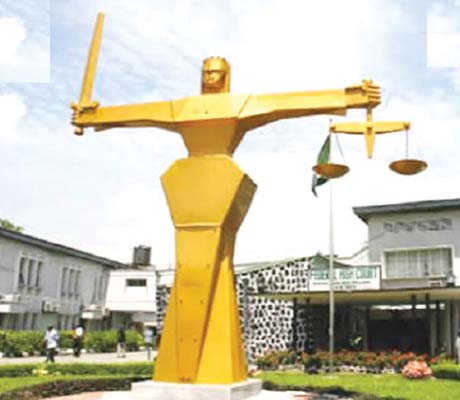The Federal High Court, Abuja has fixed Feb. 22, 2024, for hearing in the suit challenging the appointment of Mr Ola Olukoyede, as the Chairman of the Economic and Financial Crimes Commission (EFCC).
Justice Obiora Egwuatu stated this on Wednesday after the parties agreed that the date was convenient for all.
When the matter was called, the plaintiff, Mr Victor Opatola, a lawyer who chose to represent himself, told the court that he had received the preliminary objections to the suit from the Federal Government and the Attorney-General of the Federation.
Opatola, however, said that he had yet to receive any process from the National Assembly (NASS) and the EFCC chairman.
The counsel representing NASS, Mr Israel Obaniyi told the court that the legal department of the Assembly passed the information to his team only on Tuesday.
He said he would peruse the brief and file his response before the next adjourned date.
The EFCC lawyer, Mr R.O Adakole also told the court that he would also put his house in order before the next adjourned date.
The judge subsequently adjourned the matter until Feb. 22, 2024.
The News Agency of Nigeria (NAN), reports that Opatola, an Abuja-based lawyer had dragged the federal government, NASS and Attorney-General to court over alleged illegal appointment of Olukoyede, as the Chairman of EFCC.
NAN also reports that the lawyer in the suit was challenging the validity of the appointment of the EFCC chairman.
The lawyer asked the court to determine whether by the true construction and interpretation of Section 2 (1) (a) of the EFCC Act 2004, Olukoyede, who had not fulfilled the conditions of the Act, could be validly appointed as the EFCC chairman.
He also asked the court to determine whether by the true construction and interpretation of Section 2(1)(a) of the EFCC Act 2004, the person appointed to the office of the chairman of the EFCC could be said to be above the rank of assistant commissioner of police or its equivalent.
“Whether by the true construction and interpretation of Section 2(1) (a) (iii) of the EFCC Act 2004, the interpretation of subsection (iii) should be read disjunctively of subsection (ii) of the act in a manner that Olukoyede, who was appointed to the office of the chairman of EFCC can be said to have 15 Years of cognate experience in any field outside the government security or law enforcement agency.
“Whether by the true construction and interpretation of Section 2(1) (a) (ii) (iii) of the EFCC Act 2004, the national assembly can validly confirm the appointment of Olukoyede who has not fulfilled the provisions of the law.”
Opatola also prayed the court to make further declarations upon the determination of the above questions.
“A declaration that pursuant to Section 2(1)(a) (ii)(iii) of the EFCC Act, the appointment of Olukoyede to the office of the EFCC chairman is illegal and void.
“A declaration that pursuant to Section 2(1)(a) (ii)(iii) of the EFCC Act, any confirmation of the 4th defendant’s appointment made by the national assembly is void and of no legal consequence.”
The counsel also asked the court for an order of perpetual injunction restraining the national assembly from confirming the appointment of the EFCC chairman.
He further prayed to the court for an order of perpetual injunction restraining Olukoyede from holding office as chairman of EFCC.








